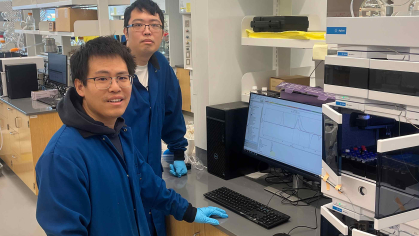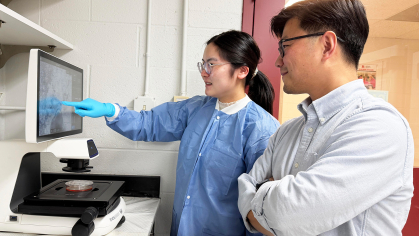Father-Son Duo Chronicles Vietnamese Immigrant Stories in Documentary
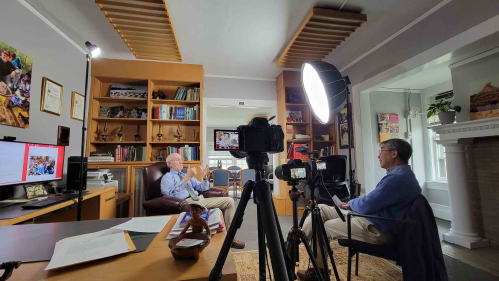
A Rutgers professor’s experience as one of the Vietnamese “boat people” inspires the effort
It’s been nearly 50 years, but Hoang Pham still remembers the moment when, at age 18, he bid his parents and home in Vietnam goodbye and headed out for a secret, treacherous sea voyage. He carried nothing but his parents’ hopes for him and his dream of becoming a university professor.
Pham, now an author of seven books and more than 210 research papers, long ago achieved his goal – he joined Rutgers University in 1993 and is a Distinguished Professor and former chair of the Department of Industrial and Systems Engineering in the Rutgers School of Engineering.
But he has never forgotten his identity as one of Vietnam’s “boat people,” the term used to describe the hundreds of thousands who escaped their country by sea after the fall of Saigon in 1975 to Communist forces. About one-third did not survive the journey.
On Father’s Day weekend, Saturday, June 14, Pham and his eldest son, software engineer-turned-filmmaker Hoang Pham Jr. (SAS 2015, computer science), will release their documentary, "Unstoppable Hope," on YouTube. The film marks the 50th anniversary of the Vietnamese refugee exodus and shares the stories of 12 refugees along with several guests – including School of Graduate Studies Dean Mark Robson, who is featured in the film. (Link to trailer here.)
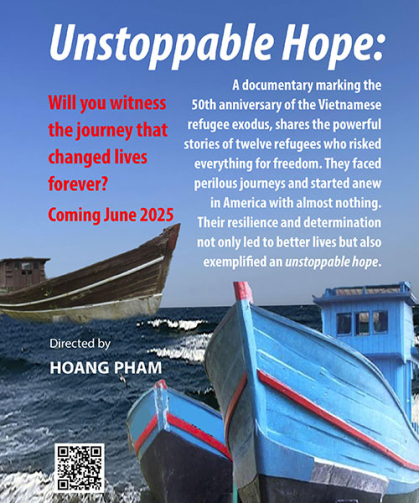
“It's important for young Vietnamese people to know their history," said Pham Sr., the film’s executive producer. “Our story is one of resilience and determination.”
Beginning in 1975 and extending into the 1990s, about 800,000 Vietnamese people undertook perilous journeys in overcrowded boats, facing threats from pirates, starvation and drowning. Many sought refuge in Southeast Asian countries such as Malaysia, Indonesia, Thailand and the Philippines, and were later resettled in the United States, Canada and Australia. Between 200,000 and 250,000 boat people died at sea.
Edgar Sandoval, the president and chief executive of World Vision, a Christian humanitarian organization, viewed a rough cut of the Phams’ film earlier this month. “This is an important story that needs to be told and never forgotten,” said Sandoval, ENG'89 (industrial engineering), RC89 (sociology.)
Pham Sr. conducted all the interviews in the film, including of Vietnamese refugees who became physicians, pastors, university professors, a U.S. Navy commander, a U.S. Air Force major and Uber’s chief technical officer. But Pham didn’t tell his own story.
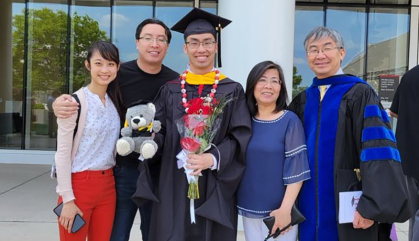
Of his children, Distinguished Professor Hoang Pham says, “They are my greatest achievement.” Hoang’s family gathered on campus to celebrate David Pham’s master’s degree in computer science in 2023: (from left) Hoang's daughter-in-law, Melissa Pham; her husband, Hoang Pham Jr. (Hoang Jr. and Melissa are both Rutgers graduates); David; Hoang Sr.'s wife, Michelle Pham; and Hoang Sr.
Robson collaborated with Pham for years on research projects before he learned about Pham’s harrowing past.
“Hoang is such a kind, compassionate and humble person,” said Robson, a Distinguished Professor. “His remarkable story serves as an inspiration to all of us about pursuing your dream, being courageous and making a commitment to society.”
Born in 1960 in a small town in central South Vietnam, Pham's early years were marked by the turmoil of the Vietnam War. “I heard gunfire every day,” he said. “People died along the roads, and it became a normal part of life.”
Despite the constant danger, Pham's family valued education and instilled in him a desire to learn.
In 1979, at the age of 18, Pham’s parents arranged for him to take flight for a chance at a better life.
“We had to escape at night,” he said. “Many people tried and failed, often ending up in jail.”
Pham departed from My Tho City, about two hours south of Saigon, boarding a small fishing boat with 275 others, far exceeding its intended capacity of 100.
The journey through the choppy waters of the South China Sea was fraught with danger.
“We had no food, no water,” Pham said. “Some people died on the boat. I survived on adrenaline and hope.”
After 12 grueling days at sea, they reached a jungle in Malaysia and stayed there for six weeks, with many, including Pham, contracting malaria. Eventually, the Royal Malaysian Navy placed the survivors in boats, hauled them back out to sea and left them there alone in international waters.
“On that cloudy day, I witnessed many boats sink and many people die at sea,” Pham said. “I was fortunate to survive, but the memories have stayed with me forever.”
Pham's journey eventually led him to the United States, where he was sponsored by Raymond Taylor, a Catholic missionary. “I was one of the first two he sponsored, and to this day, I'm still amazed that he chose me,” Pham said.
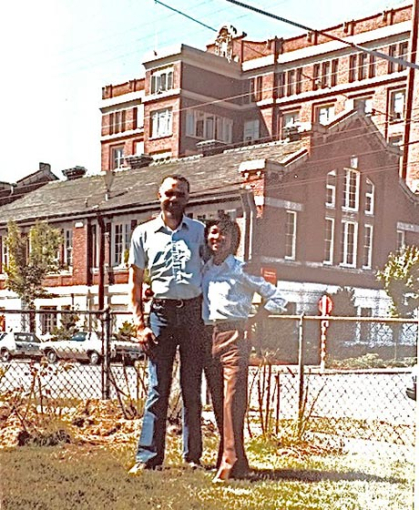
Pham dedicated the film to the late missionary. “He was very poor, but he helped many Vietnamese people,” Pham said.
Settling in Seattle, Pham faced new challenges, including severe illness and the language barrier. “I didn't speak any English,” he said. “But I was determined to learn.”
Enrolling in high school, Pham's aptitude for mathematics shone through. “I took a calculus test without understanding the English instructions,” he said, laughing. “I just guessed and passed.”
Pham's academic journey took him from Northeastern Illinois University to the University of Illinois at Urbana-Champaign and finally to the State University of New York at Buffalo, where he earned his doctoral degree in industrial engineering. His career included a stint at Boeing, where he married his wife Michelle, also Vietnam-born—whom he had met earlier—and where she also worked. He then worked as an engineer at the Idaho National Laboratory before joining the Rutgers faculty.
At Rutgers, Pham has dedicated more than three decades to teaching and research in reliability engineering and risk assessment. He has been awarded many honors, including being named a fellow by the international engineering organization, the Institute of Electrical and Electronics Engineers (IEEE).
“I love Rutgers,” he said. “It's given me so much, and I enjoy giving back through teaching and mentoring.”
Through the documentary, Pham said he wants to express gratitude to the Americans, as well as charitable organizations and churches that welcomed Vietnamese refugees. He hopes to honor the sacrifices that parents, including his own, made for their children’s future. (Pham’s parents joined their children in the U.S. in 2003). And he wants to celebrate the resilience and what he calls the “enduring spirit” of Vietnamese refugees.
"It's a way to thank those who helped us and to inspire the younger generation,” he said.
Pham and his wife live in Piscataway, N.J. His son, Hoang Jr., who previously worked as a Senior Engineer Team Lead at BridgePhase in Arlington, Virginia, is the owner and founder of Hoang Pham Films. Pham’s younger son, David (SAS, 2018, computer science, MS, 2023, computer science), is a team lead at Collins Aerospace in Sterling, Va.
“I'm very proud of them,” Pham said. “They are my greatest achievement.”
As he reflects on his journey, Pham remains humble and grateful.
“I've been blessed,” he said. “Many people helped me along the way, and now it's my turn to give back.”
He views the 12 people interviewed in the film as exemplars of the idea that determination is the cornerstone of success.
“With little English, no money and an unfamiliar culture, Vietnamese refugees had to rebuild their lives from scratch,” Pham said. “Their stories highlight their resilience and determination in the face of adversity.”
